#beginner korean
Text
One-Page Masterlist
안녕하세요! Hey everyone! I recently got an ask about my old masterlist, which is the same as my broken-down masterlist except it has all of my lessons on one page, rather than on multiple separate posts. Some may find this expanded version easier to navigate, so I’ll keep this up for y’all! My broken-up masterlist, of course, will still be available for those who find that more helpful :)
Hangul Lessons
Consonants
Vowels
Writing/Reading Korean Syllables
Some 받침 Rules
Diphthongs
Stroke Order
Some More 받침 Rules
Irregular Verbs
The Basics
Common Phrases
Numbers
Sino-Korean vs. Native Korean Numbers (Instagram Post)
Sentence Structure and Particles
Present-Tense Conjugations and Formal Language
Adjectives
Questions
Honorifics and Casual Language
Beginner
Negative Sentences
잘 and 못
Past Tense
Future Tense (-ㄹ / 을 것이다)
-ㄹ / 을 까요? (Shall we…? / I wonder…?)
-(으)세요 (Giving Commands / Asking Questions)
Telling Time
-고 싶다 (I want to…)
How to Say “And”
-지만 (However)
아/어/여서 (So…)
Negative Commands
Spacing (띄어쓰기)
Adverbs
ㅂ Irregular
Comparatives and Superlatives
난, 날, & 내가
Upper-Beginner
-(으)면 (If…)
아/어/여도 (Even though…/Even if…)
(으)면 되다 / 아/어/여도 되다 (I can…/You may…)
-아/어도 되다: Asking for and Giving Permission (Instagram post)
-(으)면 되다 & -(으)면 안 되다 (Instagram post)
아/어/여야 되다 and 아/어/여야 하다(Have to / Should)
Present Progressive (-고 있다)
How to Say “Or”
-아/어/여하다
All About 중
How to Use -(으)로
Before & After
-ㄴ/은 채로
Intermediate
Describing Nouns with Verbs (-는 것)
Describing Nouns with Verbs - Past & Future Tense (-ㄴ/은 / -ㄹ/을 것)
Nominalization
것 같다 (I think… / It seems…)
-러 가다 / -러 오다
-(으)려고 (In order to…)
-기로 하다 (to Decide to do Smth)
척하다 (To Pretend)
-게 되다
-군요 / -구나
아/어/여 보다 (to try…)
-은/ㄴ 적 있다 / 없다 (I have / have not)
-ㄹ/을 게요 (Future Tense)
겠다
-ㄹ/을 수 있다/없다 (I can / cannot)
-ㄹ/을 때 (When…)
-ㄴ/는다면 (If)
-(으)면서 and -(으)며
-(으)니까 (Because / So)
-아/어/여주다
-(ㄴ/는)다 (Narrative Form)
Quoting
Let’s…
Quoting continued
(으)ㄹ래요? (Wanna…?)
-죠
-대로
More Quoting - 대 & 래
잘하다 & 못하다 vs. 잘 하다 & 못 하다
-아/어 가지고
-(으)려면
-는 길에 & -는 길이다
-(으)면 vs. -ㄴ/는다면 (Instagram Post)
-았/었을 것이다
-느라고
-는 데(에)
-ㄹ/을 뻔하다
Upper-Intermediate
-ㄴ/는데
-(으)ㄴ/는지 (Whether or not)
-(이)라는…
All About 아무리
-잖아요
Expressing Surprise
-시 (Honorific)
Making Comparisons
-아/어/여지다
I might…
So that…/To the point where…
Causative Verbs
시키다
Passive Verbs (part 1)
Passive Verbs (part 2)
-ㄴ/은가 보다 & -나 보다 (I guess…)
-ㄹ/을수록
Other Meanings of 싶다
-자마자 & -는 대로(As soon as…)
-긴 하다
-치고
-김에
차라리 (Rather)
-(으)ㅁ Nominalization
-기는 무슨 & -기는 개뿔
-고 보니까
-듯(이)
버리다
-(으)면 좋겠다 & -(으)면 하다
-길 바라다
Advanced
-거든(요)
-줄 알다/모르다
-ㄹ/을 테니까 and -ㄹ/을 텐데
-았/었던
아니라 and 대신에
-ㄹ/을 리가 없다
편이다, 별로, and More
-지 그렇다 (Why don’t you…?)
-ㄹ/을 걸
-ㄹ/을 까 보다
-다면서요
-다니 part 1
-다니 part 2
뜻이다 & 말이다
-다가
-더라고(요)
-더니
Some colloquialisms: 아니시에이팅 and 뭐 이렇게
-(으)ㅁ Sentence Ending
-다 보니까
What does 따위 mean?
-ㄴ/는데도
Korean Idioms
Vocabulary
Must-Know People
Must-Know Places
Must-Know Things
Must-Know Verbs
Must-Know Adjectives
Countries
Months, Days of the Week, and More
Clothing (옷)
School (학교)
Autumn (가을)
Autumn (w/Pictures!)
More Questions
House / Apartment (집 / 아파트)
Emotions / Feelings ( 감정)
Animals (동물)
Loan / Konglish Words
Food and Drink (먹을 것과 마실 것)
Parts of the Body (몸)
Counters
Modes of Transportation (교통 수단)
Colors (색깔)
Colors (with Pictures!)
Weather (날씨)
Winter (겨울)
Music & Instruments (음악과 악기)
Baking Gingerbread Cookies
Emergency (비상)
Hygiene & Bathroom (위생 & 화장실)
Indefinite Pronouns
Work / Office (일 / 사무실)
Spring (봄)
Coronavirus Prevention (코로나바이러스 방역)
How to Wash Your Hands (손을 씻기)
Time (시간)
Korean Cuisine (한식)
Summer (여름)
Summer (여름) w/Pictures!
Graduation (졸업)
Identity (독자성)
Korean Text Slang
Similar Words
Makeup w/Pictures! (화장품)
Family (with Pictures!)
Pronouns
How to Say “Still” and “Already” in Korean
Tastes & Textures (맛과 질감)
K-Pop Audition
K-Pop Fandom Terminology
Different Ways to Say “Change”
Flower Names
What Does 원래 Mean?
What does 오히려 Mean?
College
Hanja Lessons
최
수
악
식
급
동
부 & 불
애
출
퇴
예
음
중
학
습
연
생
대
입
인
문
감
과
원
특
만
후
무
Charts
Present, Past, and Future Tense
Question Words
잘 vs. 못 and Negative Conjugations
Future Tenses
-았/었던 vs. -던 (at end of lesson)
Particles
Some 받침 Rules
Gifving Commands
Conjunctions and -아/어/여서 vs. -(으)니까
-(으)면 vs. -다/라면 and Different Ways to Say “And”
How to Say “Or” (at end of lesson)
Telling Time (at end of lesson)
Comparatives and Superlatives
잘하다 & 못하다 vs. 잘 하다 & 못 하다 (at end of lesson)
Comparing 잘하다/못하다, 잘 하다/못 하다, & 수 있다/수 없다
Irregular Verbs
Pop Quizzes
Level 1
K-Pop Breakdowns
TXT - “Cat & Dog”
Twice - “Feel Special”
Enhypen - “Fever”
2NE1 - “Go Away”
Lee Hi - “Only”
“기억을 걷는 시간 (Time Spent Walking Through Memories)”
KCM - “An Old Love Story (흑백사진)”
Taeyeon - “Can’t Control Myself”
Epik High - “Lost One”
Colde - “A Song Nobody Knows”
IU - “My Sea”
Enhypen - “Polaroid Love”
유라 (youra) - “하양 (RAL 9002)″
BTS - “Ddaeng”
Stray Kids - “For You”
Woozie - “어떤 미래 (What Kind of Future)
TXT - “Eternally”
LOONA - “Heart Attack”
Stray Kids - “Muddy Water”
LOONA - “Girl Front”
Pentagon - “Daisy”
BTS - “Sea”
Semester in SK
Nami Island (남이섬)
Things to Buy at Daiso
Shopping Phrases
Ordering Coffee
Signs in Korea
Ordering at a Restaurant
Riding the Seoul Subway
Things at the 편의점
Korean Curse Words
Etiquette in South Korea
Drinking Culture
Hanja in Real Life
Holidays in South Korea
Korean Cuisine
Concert Ticketing in South Korea
K-pop Comebacks in Korea
Summer in South Korea
What I Learned
#korean#korean language#hangul#korean grammar#korean vocab#korean vocabulary#learn korean#learning korean#langblr#Korean langblr#masterlist#apok#apopofkorean#study korean#studying korean#kpop#kpop lyrics#basic korean#beginner korean#intermediate korean#advanced korean#hanja#한국어#한글#한자#한국어 공부하기#한국어 배우기#한국어 문법#한국어 어휘#초급 한국어
2K notes
·
View notes
Text
google drive of free korean language learning resources
hi everyone! because i put tutoring on hold while i am working full time but still want to provide help to those who want to start learning/want to practice their korean, i am continuously compiling material for free learning :)
resources are totally free!
most are typically aimed at children (which is great for beginners!!)
hangul practice
vocabulary building
printable/downloadable
example of scans:
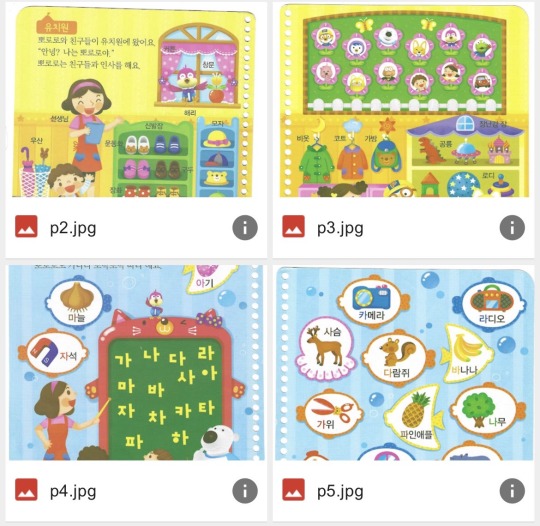
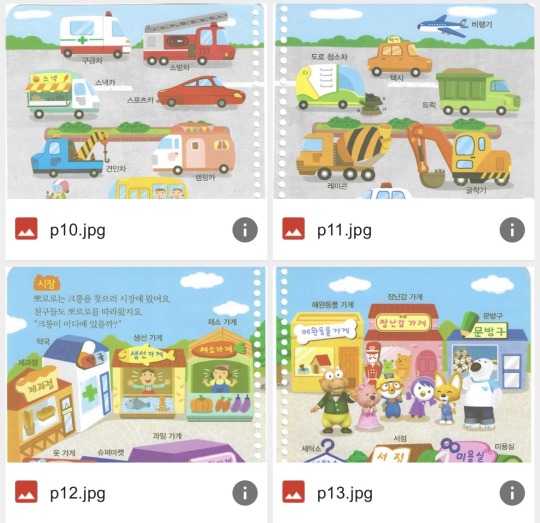
example of grammar breakdowns:
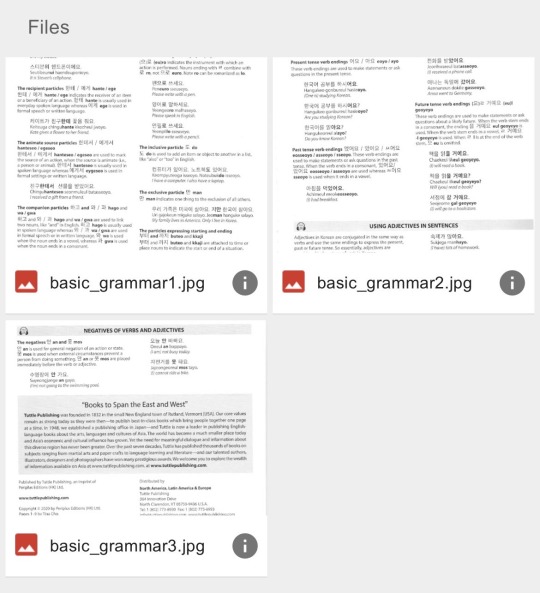
i will be adding material over the coming weeks and continuously as i come across material! updates may be frequent or slow down at times.
note: resources are free, and they’re totally free to share and use! but please do not repost without credit, and because i buy these from my workplace with my own money and spend time scanning them and cleaning them up and organizing them, please consider tipping me as much as you’d like ♥️
here is the link to the drive! (sorry, can’t hyperlink on mobile currently)
enjoy, and thank you in advance! have fun and feel free to ask me any questions—i am a korean studies grad and was a tutor for the beginning korean classes at my university. i am happy to help however i can!
♥️ joey
#ok about to tag the hell out of this sorry in advance#studyblr#study korean#korean#learning korean#hangul#learning hangul#beginner korean#korean study#korean studyblr#korean study notes#한글#한국어 공부하기#한국어공부중#한국어 배우기#korea#korean langblr#korean language#resource#language resources#korean learning#korean learning resource#OK ANYWAYS feel free to reblog like etc#just want to provide some help :)))
2K notes
·
View notes
Text
Korean Weather Vocabulary
Watch my lesson on weather in Korean: https://www.youtube.com/watch?v=D0V_FJsVzkI
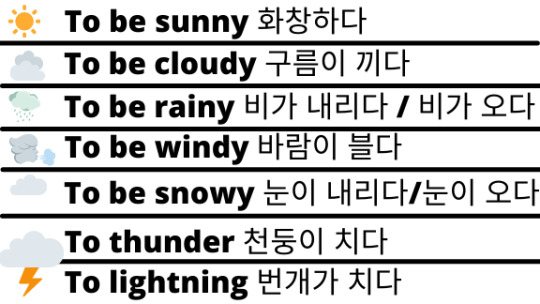
#korean lesson#learn korean#korean#korean vocabulary#korean vocab list#korean vocab#beginner Korean#beginner korean lesson#Korean language#language learning#learning korean#languageblr#language study#langblr#weather in Korean
44 notes
·
View notes
Text
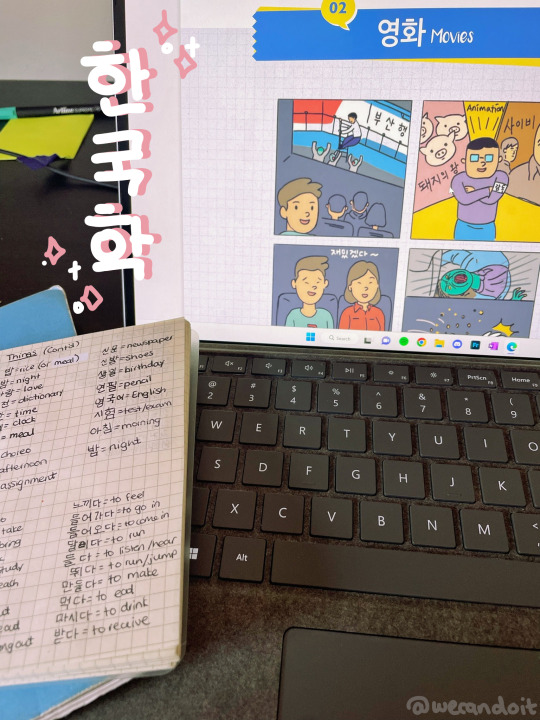

~85/100~
04.10.2022 // posting last friday's update today bc i'm *quirKy* like that y'know?
🎧: zombie by day6 | ☕️
#original#100dop#100 days of productivity#studyspo#studyblr#langblr#korean langblr#motivation#productivity#student#academia#bright academia#beginner korean
80 notes
·
View notes
Text

How To Ask Questions In Korean
We’ll go over the most basic and easiest way to do it and then the most confusing, which is actually using the question words to form your own question. You should be familar with sentence structure first to understand this well. I have another post on it here.
The first way is to simply turn a normal sentence into a question by raising your intonation at the end of it. Like when you ask a question in English your voice goes up a little at the end of the sentence.
하교에 가요. (I am going to school.)
학교에 가요? (Are you going to school?)
The sentence doesn’t change, but the way you read it does. You can try it by reading these out loud or in your head above.
The Question Endings:
~ 입니까? / 습니까?
~니?
~ 나요?
The next way to ask questions is to simply attach one of these.
The formal high respect ~습니다 is never used as a question. When asking a question in this form, instead of using ~습니다 you must use ~ㅂ/습니까. ~ㅂ니까 gets added directly to stems ending in a vowel, and ~습니까 gets added after a stem ending in a consonant. You can do this with all tenses.
Past Tense: 았/었/했습니까
Present Tense: 았/었습니까 / 합니까
Future Tense: 겠습니까 | ㄹ 것입니까 / ㄹ 겁니까
When asking a question, instead of ending your sentences with ~아/어, you can end them with ~니. This is an informal way to ask a question, and you can do this in all tenses.
For example:
Past tense: 했니, 먹었니, 갔니, 이었니
Present tense: 하니, 먹니, 가니, 이니
Future tense (~겠): 하겠니, 먹겠니, 가겠니
Future tense (~ㄹ 것이다): 할 거니, 할 것이니, 먹을 거니, 먹을 것이니
You can use ~나(요) at the end of a sentence to ask a question also. It can be used to make a question sound slightly softer than the other ways to ask a question. However, ~나(요) is more often used with verbs and with 있다 and 없다.
It is possible to use this in the future tense, but it only sounds natural when applying it to the ~겠다 future conjugation. Adding ~나(요) to 이다 is typically not done, and therefore adding it to words that are conjugating using ~ㄹ/을 것이다 is unnatural.
Theres’s another ending i didn’t cover in this post : ㄴ가요? | It functions the same as -나요?
The most confusing one:
I’ll only cover the very basics in this post, but it can become more complex. Incase you don’t know the question words here is a list of basic Korean question words (What, when, where, who and why)
뭐 - what
언제 - when
어디 - where
누구 - who
왜 - why
어떻게 - how
Depending on which question word you are using, building a question can be really easy or really confusing.
Most question words are adverbs, which means it can be used/placed as an adverb in sentences. Adverbs can be used almost freely in sentences and technically do not have any specific location that they need to be used.
The most common position for these adverb-question words is before the verb. If there are other adverbs in the sentence (including the negative “안”) the question word is usually placed first. You may see these question words put at the end of a sentence as well. Remember the rule: before a verb - if you ever get overwhelmed.
Examples:
왜 늦었어요?
Why are you late?
한국에 언제 왔어요?
When did you come to Korea?
내 신발이 어디 있어요?
Where are my shoes?
오늘 오후에 뭐 할 거예요?
What are you going to do[your plans for] this afternoon?
어떻게 알았어요?
How did you find out?
In Korean, 누구 has the function of a pronoun. 누구 can be used in the place of a noun in a sentence – that is, it can be used to replace the object, the subject or as a noun before 이다.
This is the same in English – as you can see in the following three examples:
Who will study Korean tomorrow? – ‘who’ is the subject of the sentence.
Who will you meet tomorrow? – ‘who’ is the object of the sentence -“you” is the subject
Who is that person? = ‘who’ is ‘that person’ in the sentence
Examples:
누구를 만났어요? - who did you see/meet?
승규 씨가 누구입니까? - Who is Seung Kyu?
That's all for today's post. Check Out More Korean Lessons Here! Also check out my Spring Fling Challenge.
#한국어#korean langblr#korean language#korean lesson#questions in Korean#how to ask questions in Korean#Korean question words#질문#한국어 공부#korean vocabulary#한국어 단어#learning korean#korean grammar lesson#beginner korean
69 notes
·
View notes
Text
[Korean->English] @BTS_twt 11:20 PM/AM October 12th 2013 Tweet - Color Coded Translation (Beginner Friendly)
Link to original tweet
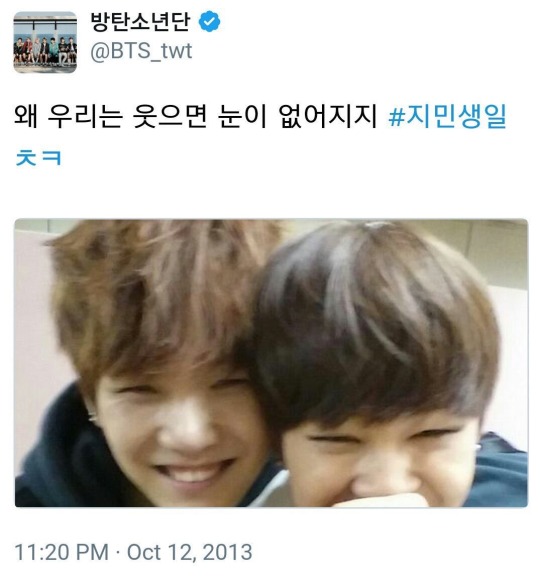
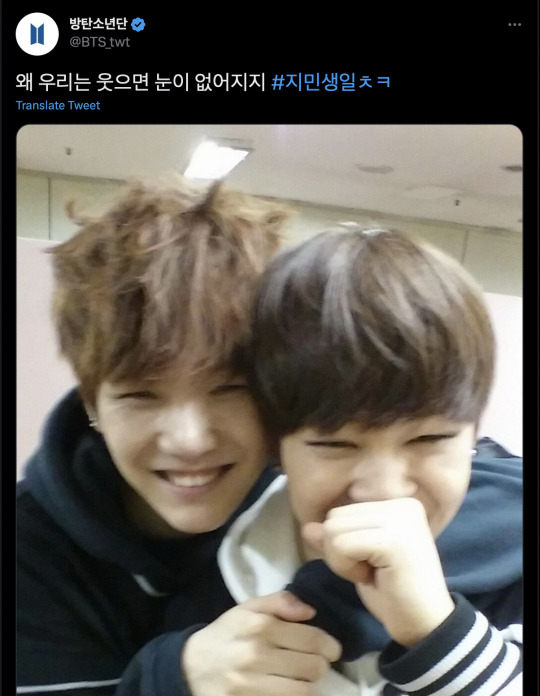
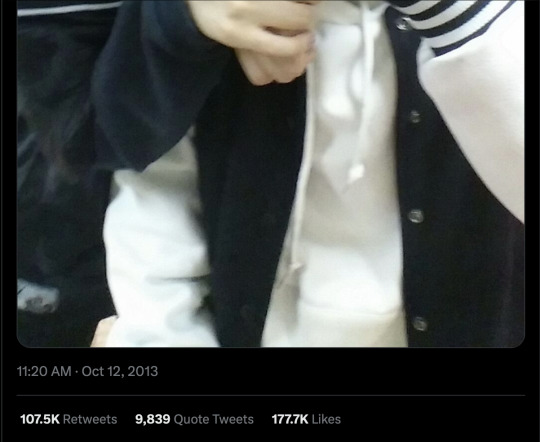
—
왜 우리는 웃으면 눈이 없어지지 #지민생일ㅊㅋ*
Why do our eyes disappear when we smile #JiminBirthday
*ㅊㅋ means either the sounds 'ch' and 'k' to mimic the sounds of laughter or the 'ch' may singularly be a short version of "축하" (congratulations) according to this HiNative page.
—
Please correct me if I made a mistake.
#polyglot thought translation#polyglot thought translations#color coded translation#korean translation#korean language#learn korean#korean#beginner korean#south korea#bts twt#bts#bts army#korean learning#korean langblr#korean lesson#learn korean with kpop#kpop#kpop boys#kpop idols#kpop twt#kpop translation#english translation#korean to english#kpop tweets#kpop twitter#kpop bts#bangtan boys#bangtan sonyeondan#bangtan#bts jimin
4 notes
·
View notes
Text
it's...missing smackjeeves hours..
telling myself if no one makes a good alternative for smackjeeves in the next like five years, im gonna start making one myself (only 10% serious)
i just miss like that atmosphere of 100% unmarketable, just comic sharing/making space.
where we all knew that 99% of the time the comics we see will never get finished bc ppl get busy, kids grow up and change interests ,etc. (i mention kids bc most of my memories of smackjeeves was when i was a teen, so it was a significant like developmental years as an artist kind experience for me)
like i remember most of the comics were like
barely legible sketch pages with like text written in mspaint.
there was absolutely no quality standard. and that's why it was so good
it made me as a kid feel like oh i can do comics! cause it can be WHATEVER YOU WANTED IT TO BE AND LOOK HOWEVER WAY.
and the collaborative ones on smackjeeves were so fun to look at
just overall.
having that. rough, crude, unmarketable space for art/comics was significant.
#hating the current comic spaces#the owner of smackjeeves had to sell smackjeeves to a korean mobile company that also owned a webcomic site cause the owner had health#issues and also struggled with funding the site costs#and he hoped that by being owned by a bigger company it would be taken care of better but it just eventually completely shut down#i dont have any hard feelings towards the creator ofc there's only so much an independent owner of a big site could do#so as much as i joke about i'll make it myself i do feel like it's unapproachable bc i feel like i'd run into the same issues with#not having the funds to run a site#but i am also very gungho and would be willing to just try it just for the sake of wanting bad comics to come back#please truly that was the most inspiring days for comic creating#i think beginner art and unmarketable art is like the backbone of art community imo#edit meant to write mobile GAME company not a phone comapny
28 notes
·
View notes
Text
よろしく, 안녕 😊🩵
new to posting on studyblr but, unfortunately, been on tumblr for too damn long. n e ways, i desperately need help with my studies so if you’re WILLING to, ill be most definitely honored 😭🤞🏾
#japanese#japanese learning#japanese langblr#korean studyblr#korean#japanese studyblr#korean language#korean study#japanese study#i’m like a beginner @ korean but like🤭 almost pass beginner in japanese😚
23 notes
·
View notes
Text
UNLEASHIA Satin Wear Healthy-Green Cushion Review
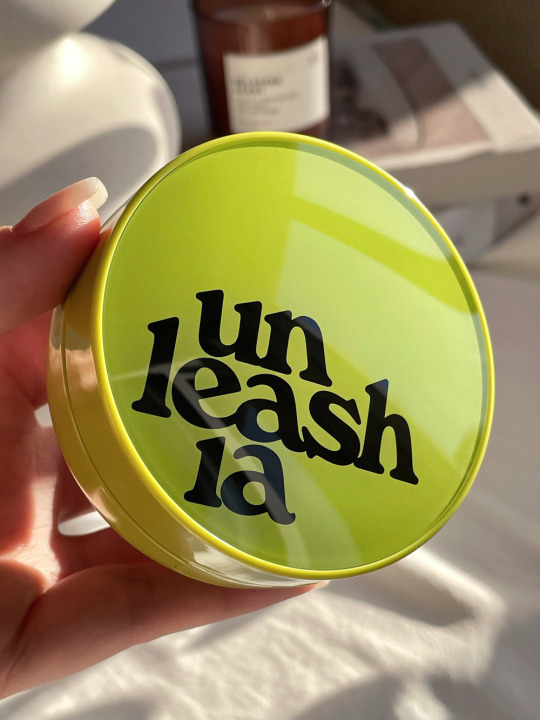
Do you incorporate cushion foundations into your makeup routine? I recently tried out the popular Unleashia cushion, but, personally, it didn't quite meet my expectations.
If you're curious about my experience and want to get all the nitty-gritty details, read my full blog post: UNLEASHIA Satin Wear Healthy-Green Cushion Review
Let me know what your favorite base product is!
#kbeauty#korean makeup#korean cosmetics#kbeauty reviews#kbeauty blog#kbeautylover#beauty tips#korean cushions#cushion compact#cushion foundation#foundation#oily skin#unleashia#Satin Wear Healthy-Green Cushion#jolse#korean skincare#beginner makeup
15 notes
·
View notes
Text
Korean Learning - 2 months recap
I hadn't planned to study Korean during March, the Horrible Month of Study Work Sleep No Energy for Anything Else but I did end up downloading lingory, which was recommended to me on Tumblr. So here is my review
Lingory is like Duolingo, BUT there are more ads (one video add before and after every lesson) BUT there are no stupid hearts/lives. You can make as many mistakes as you want! That was liberating.
Every lesson (or Day) is usually divided in 3 sections: vocabulary, grammar and a final test. Every once in a while there is a "test day", with only a test, which rather felt like the rest days in those Chloe Ting challenges.
I really appreciated how some exercises allow you to "spell" the words by selecting the right syllables, rather than the complete word. It's v useful when learning Hangul.
It did teach me the bare basics and a bit of grammar but at around Day 20 it absolutely wants you to learn how to tell the time and the date and the days of the week like... who needs that. That's something you learn on your own skin by going through The Horrors when you get to Korea. Not now. I want to watch kdramas now. So it lost me after that, but I managed to complete 26 Days.
My verdict: it's fine if you want to mindlessly learn a little bit of Korean every day but not indicated for long-term goals or quick progress.
Month 3 plan
Today I completed the first lecture of the King Sejong Institute Beginner online class. It's fun and it's free! I also feel like it teaches grammar better than Lingory. Perhaps I will soon find out why Korean has two numeric systems, which Lingory wanted me to learn without explaining when to use which.
I plan to finish the course (which comprises 20 lectures) by the end of April. I want to try and work on it every day after dinner.
I'll create an Anki deck with words from the course that I find to be useful.
And I also want to read at least 1 balloon from Marry My Husband the webtoon in Korean every day to better my Hangul reading speed. I won't understand anything but whatever, it's fun anyway.
#I swear I didn't know the difference between Tuesday Wednesday and Thursday until I moved to the UK but whatever#lingory#korean learning#language learning#studyblr#langblr#king sejong institute#korean beginner
2 notes
·
View notes
Text
I'm finally attempting to learn some Spanish, via duolingo, and dude. I thought I got tongue tied and slipped into accents when I spoke English. sheesh, this past lesson I was talkin things out loud and so many things sounded like a French or Italian accent when I said them 😅😭
also if there are other free apps better than Duolingo lemme know!
#nat talks#i took like 3-5ish years of french from highschool to college#tho college was more review than anything?#and while french had a hand in introducing me to good friends i have today#i regret not taking spanish instead cause ive been in a good handful of situations where it#wouldve been great for me to speak spanish and so attwmpting to remedy that#we'll see how it goes#I've never been great at discipline needed to learn a language 😩#im gonna try and look at some of the beginner conversation and language tiktok accounts too#i already have a bunch of korean japanese and mandarin ones that pop up#im kinda wanting to start one of them too but feel like itd make it harder trynna learn two#at once
2 notes
·
View notes
Text
Beginner & Upper-Beginner Lessons
Click here for the masterlist of all my lessons!
Beginner
Negative Sentences
잘 and 못
Past Tense
Future Tense (-ㄹ / 을 것이다)
-ㄹ / 을 까요? (Shall we…? / I wonder…?)
-(으)세요 (Giving Commands / Asking Questions)
Telling Time
-고 싶다 (I want to…)
How to Say “And”
-지만 (However)
아/어/여서 (So…)
Negative Commands
Spacing (띄어쓰기)
Adverbs
ㅂ Irregular
Comparatives and Superlatives
난, 날, & 내가
Upper-Beginner
-(으)면 (If…)
아/어/여도 (Even though…/Even if…)
(으)면 되다 / 아/어/여도 되다 (I can…/You may…)
-아/어도 되다: Asking for and Giving Permission (Instagram post)
-(으)면 되다 & -(으)면 안 되다 (Instagram post)
아/어/여야 되다 and 아/어/여야 하다(Have to / Should)
Present Progressive (-고 있다)
How to Say “Or”
-아/어/여하다
All About 중
How to Use -(으)로
Before & After
-ㄴ/은 채로
#korean#korean language#beginner korean#korean lesson#korean lessons#korean resource#learn korean#learning korean#study korean#studying korean#langblr#korean langblr#korean grammar#한국어#문법#한국어 레슨#한국어 공부하기#한국어 배우기#한국말
383 notes
·
View notes
Text
thinking about what i’ll do (study-wise) the rest of the summer once my class is over next week, these are my loose plans as of now
daily routine:
go through topik1 anki deck
write a journal entry (original sentence practice) (maybe i’ll post those here?? we’ll see)
skim/review some of textbook (to not forget and review things i missed or slacked on), and/or skim/preview some of next semester’s textbook (to mentally prepare lol)
other random things to do for fun and practice:
studying dialogues from dramas
studying with kids songs/videos/cartoons
listen to korean learning podcasts (like ttmik real conversations, etc. or just the audios that came with my textbook)
browsing korean/language learning communities online
#🌟.txt#korean#langblr#my class is getting hectic and scary for the last week and half thats left so thinking about this is calming me down#i <3 studying on my own with no grades or pressure lmao#almost done almost there#but anyway if anyone has good media recs for beginner level korean feel free to drop them
6 notes
·
View notes
Text
Test your Korean Vocabulary!
#korean vocabulary#korean language#learning korean#learn korean#beginner korean#language learning#korean vocab#korean#korean lesson#practice Korean
2 notes
·
View notes
Text
korean diary | day 3
안녕하세요! 오늘은 2022년 11월 10일이에요. 최근에 기분이 안좋대요, 근대 열심히 일하고있다. 어제는 아이라이너 했어요 (나는 정말 잘 못해요), 그게 기분 좋아. 여러분 잘 지냈어요? 화이팅!
tr: hello! today is 10 September 2022. i have been feeling a little down recently but i'm working hard. yesterday I did my eyeliner (I'm really bad), that made me happy. how are you guys? fighting!
#korean diary#let me know if i've made any mistakes!#beginner#korean langblr#langblr#language learning#studyblr#academia
28 notes
·
View notes
Text

How To Make Commands & Requests Using: (으)세요, 아/어 주다, & -지 마세요
V + (으)세요 = Please (verb)
usage:
- to politely request, suggest something, or make a command
- can also be used to end a question to make the question more polite. (Requesting info)
- Ex: 영어 하세요? = can you speak English?
Ends in consonant - 으세요
Ends in vowel - 세요
- 세요 is a shortened version of -셔요, which comes from the suffix -시. -시 is used to make verbs and adjectives more polite
- (으)십시요 is the same thing as -(으)세요, but is a very formal way of giving commands.
Examples:
거기 앉으세요 - Please sit there.
내일 시험이 있으니 열심히 공부하세요.
Since there is a test tomorrow, please study hard.
물 더 주세요 - Please give me more water
아/어 주다 - Give; To do something for someone
usage:
- 주다 on it’s own means “to give”
- By adding ~아/어 주다 to the stem of a word, you can imply that the action is somehow beneficial to you (or whoever the action is being done for)
- It’s almost as if you’re telling someone to do you a “favor” and do it for you
- Conjugate the first verb before adding 주다
- Usually (으)세요 is added to make your request more polite
> 아/어 주세요 = Please do for me
Examples:
창문을 열어 주세요.
Please open the window. (For me)
선생님은 저에게 설명해 줬어요.
The teacher explained it to me.
아/어 주다 + negative situations
usage:
- 지 말다 is used when telling somebody *not* to do somthing.
- you can put ~아/어 주다 and ~지 말다 together to create the meaning of “please don’t do it for me”
- V -지 말아 주다 (지 말아 주세요)
Examples:
수업 시간 동안 자지 말아 주세요.
Please don’t sleep in my class.
저를 쳐다보지 말아 주세요.
Please don’t stare at me.
-지 마세요 - Don’t do it
usage:
- this is a form of 지 말다, except it’s a different meaning than we just learned
- 지 마 means you are commanding someone not to do something (not for you, but just in general)
- 지 마 + 세요 = polite command
Examples:
가지 마세요 - Please don’t go
너무 빨리 먹지 마세요 - Don’t eat your food too fast
슬퍼하지 마세요 - Please don’t be sad
MORE EXAMPLES OF ALL:
어떤 책을 읽으세요?
Which book are you reading?
그걸 내일까지 해 주세요.
Please have it done by tomorrow.
앞으로는 더 조심해 주세요.
Please be more careful in future.
샐러드와 드레싱을 섞지 말아 주세요.
Please don't mix the salad and the dressing.
담배는 피우지 말아주세요.
No smoking, please.
목이 아프면 말을 많이 하지 마세요.
If you’re sick, please don’t talk a lot.
엘리베이터를 타지 말고 계단으로 올라가세요.
Please don’t ride the elevator, but go up the stairs. (Instead)
박물관 안에서 사진을 찍지 마세요.
Please don’t take pictures inside of the museum.
That's all for this lesson! If you are an intermediate learner looking for grammar lessons, you should check here!
#한국어#지 말다#-지 마#-지 마세요#아/어 주다#아/어/해 주세요#(으)세요#what does 주다 mean?#korean language#한국어 문법#korean grammar lesson#beginner korean#koreanstudyjunkie
32 notes
·
View notes